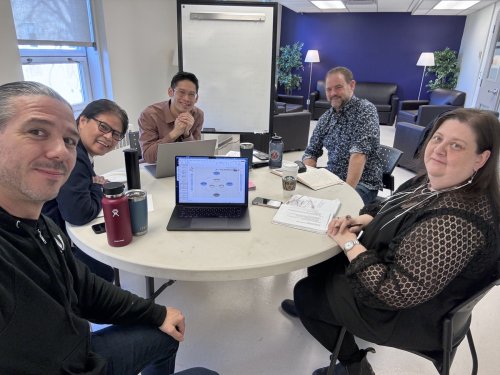Nichole Forbes, my partner-in-mischief in the Canadian Learning Community for Decolonization and Innovation in Theological Education (we’ll call it “CLC” for short here), sometimes uses this wonderful phrase:
“Good soup.”
It comes from Nichole’s time as an organizer for social justice and in women’s ministry and means many things – yes, good food and hospitality, but also deep conversation and human connection. Good soup kind of sums up our CLC journey so far.
The vision for this work, which is supported by the Lilly Endowment’s Pathways for Tomorrow Initiative, is huge. It comes from a conviction that re-imagined theological education and pastoral formation is critical for the integrity of the church today. I really love what NAIITS Elder Liaison Adrian Jacobs often says: “This is a kairos time of truth and reconciliation.” And from what I’ve seen in ecumenical travels over the last few years, the vision for the CLC is a creative and bold approach to the fulfillment of No. 59 and No. 60 of the Truth and Reconciliation Commission of Canada’s Calls to Action (regarding church education and theological training). So CLC has great promise in this kairos time.
NAIITS: An Indigenous Learning Community has been doing decolonization and innovation in theological education in rigorous and relational ways for 25 years now. Those of us who have had the joy of being invited to “come, take a seat” in the NAIITS community know that the Spirit is here in the power of stories and relationships. Those stories and relationships are a communal living out of the Gospel that inspires and motivates each of us in the places Creator has placed us.
Well, stories and relationships are also central to the work of the CLC. Sharing stories about what gives life in its fullness in theological education and ministry and then building on those good things helps us focus on what works, rather than become consumed by reacting to the problems that surround us. When CLC staff visited Tyndale Seminary in Toronto recently, one of the community members there explained decolonization through appreciative inquiry in a good way:
CLC’s work of decolonization is not about oppression hunting and punishing colonizers, it’s about celebrating the good things of justice and belonging already happening at Tyndale and building on them.
Good soup!
Through stories and relationship, community and unity in the Spirit are being formed. Together, we rub shoulders, share meals, laughs, shed tears and share our earnest struggles – the stuff that refines and shapes us for co-labouring with Jesus in the work of being salt, light and hope. In these first few months of the CLC, whether in meeting halls, on walks, over great meals or in late night theological chats, we are becoming a spiritual community where beautiful things are happening:
- In conversation around the table, ideas about mission were upended for one of us through a discussion about right relationship;
- We experienced grace from an Elder teaching us about cultural protocol in Mi’kma’ki;
- In wresting with the “D-word” (decolonization), we’ve learned about the gift of treaty kinship.
This good soup is what we are up to in the CLC. We know that the journey ahead will be beautiful and challenging, but it is also hope-filled because of the friendships and community that are being formed. As the story continues, we’ll be sure to share updates with the NAIITS and wider Indigenous Pathways communities.
— Mike Hogeterp, lead facilitator of the Canadian Learning Community for Decolonization and Innovation in Theological Education
